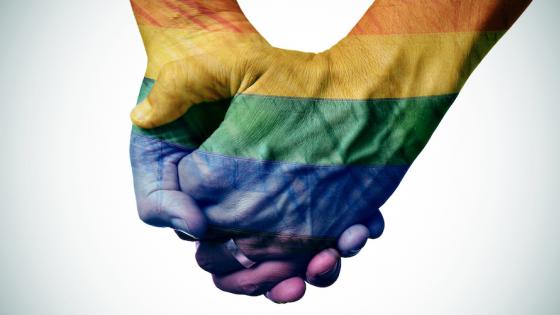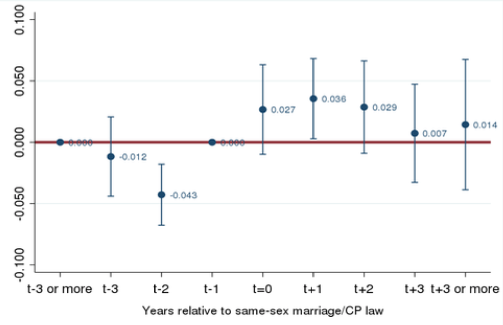Scholars have long recognised the importance of understanding whether laws shape or simply reflect societal attitudes (Downs 1957, Besley and Case 2003), but providing credible empirical evidence on this question has proven difficult. The rollout of same-sex relationship recognition policies throughout Europe provides a unique opportunity to shed new light on this issue. Advancements in civil rights for lesbian, gay, bisexual, and transgender (LGBT) individuals in Europe (as well as the Americas and Australia) have been among the most striking social changes in recent decades. As recently as 2000, same-sex marriage was illegal throughout Europe. At present, same-sex couples can legally marry in 17 European countries while same-sex registered domestic partnerships or civil unions are allowed in 11 others. Social acceptance of LGBT individuals has increased considerably in these countries over the same period. Figure 1 shows that the share of citizens who agree with the statement that “Gay men and lesbians should be free to live their own life as they wish” increased considerably – by about ten percentage points.
Figure 1 Trends in attitudes towards sexual minorities
Notes: This figure includes all countries that were observed during at least 10 years of the ESS. We further restrict the sample to observations used in the full-sample estimation.
Source: Aksoy et al. (2018), based on 2002-2016 European Social Survey Data.
Legal change and societal attitudes: Cause and effect
These recent developments raise the question whether legal changes merely passively reflect changes in society’s attitudes or, in contrast, whether laws have an independent influence on people’s views of LGBT individuals. Flores and Barclay (2016) discuss four possibilities in this regard: backlash, legitimacy, polarisation, and consensus. A backlash model predicts that attitudes toward LGBT people might become substantially more negative following legal recognition of same-sex relationships, especially in the case of judicial rulings. A legitimacy model predicts that legal rulings may increase acceptance and approval of LGBT populations as people infer the laws as increasing social legitimacy. A polarisation model predicts that focusing on events such as major same-sex relationship policies may reduce ambivalence toward LGBT people and increase both social approval and disapproval of sexual minorities. Finally, a consensus model predicts that attitudes shape policy but that policy has no effects on attitudes.
What do the data say?
In a recent paper (Aksoy et al. 2018) we provide new evidence by studying the relationship between legal same-sex relationship recognition policies and attitudes toward sexual minorities in Europe. We analyse data from the 2002-2016 European Social Surveys which asked over 325,000 individuals across Europe identically worded questions about a range of social and economic issues. Of particular interest is a specific question on whether the respondent agrees that “Gay men and lesbians should be free to live their own life as they wish”. We use cross-country variation in the timing of same-sex relationship recognition policy adoption to estimate difference-in-differences models while controlling for individual demographic characteristics, country characteristics, other LGBT policies (such as non-discrimination laws, adoption policies, and hate crimes legislation), country, year, and month fixed effects, and linear country- specific time trends.
We find that – consistent with a legitimacy model – laws docause changes in people’s attitudes. The introduction of a relationship recognition law for same-sex couples is associated with a statistically significant 3.6 percentage point increase in the likelihood that a respondent agreed that gay men and lesbians should be free to live their own life as they wish. This effect is about five percent of the baseline average. These results mean that the adoption of expanded relationship recognition policies for same-sex couples can explain 36% of the ten-percentage point increase over our sample period in the share of adults agreeing that gay people should be free to live their own life as they wish (Figure 1).
Event study models (Figure 2) confirm that the effects we identify emerge only after policy adoption, suggesting that the policies cause changes in attitudes (and not vice versa). We also show that the effects of same-sex relationship policies are unique to LGBT attitudes – there is no systematic relation between these policies and people’s views on other social and economic issues (including attitudes toward other minority groups such as immigrants). Moreover, we document that the effects we identify are widespread across many demographic groups.
Figure 2 Event study for same-sex relationship recognition
Note: This figure is based on the specification in column 3 of Table 2, which contains linear country-specific time trends. The sample consists of countries that ever adopted legal same-sex marriage between 2001 and 2016.
Source: Aksoy et al. (2018), based on 2002-2016 European Social Survey Data.
Implications
Our results suggest that as marriage equality and other relationship recognition policies continue to expand throughout the world, we might expect to observe continued improvements in attitudes towards sexual minorities in the countries involved. This could translate into less discrimination (or more inclusion) in labour and housing markets, improved mental health for sexual minorities, and a range of other potential benefits associated with less anti-LGBT sentiment.
Our findings also contain a stark warning. If pro-LGBT laws increase societal acceptance of sexual minorities then, conversely, anti-LGBT legislation can erode such acceptance. Various countries have recently proposed or introduced legislation to explicitly outlaw same-sex sexual activity (Chad), to introduce a constitutional ban on same-sex marriage (Armenia, Bolivia, Dominican Republic, Ecuador, Hungary, the Slovak Republic, and Kyrgyzstan) or to even ban the “propaganda of non-traditional relationships” (Kyrgyzstan and Russia). In line with our results, social acceptance of LGBT individuals has remained low or declined further in many of these countries. Amnesty International has reported that more than hundred gay men were abducted, tortured and in some cases killed in Russia’s Chechnya republic in 2017. Our findings suggest that legislators may take part of the blame for the erosion of tolerance towards sexual minorities that can result in excesses like these.
References
Aksoy, C G, C Carpenter, R De Haas and K Tran (2018), “Do Laws Shape Attitudes? Evidence from Same-Sex Relationship Recognition Policies in Europe”, IZA Working Paper No. 11743.
Downs, A (1957), “An Economic Theory of Political Action in a Democracy”, Journal of Political Economy 65(2): 135-150.
Besley, T and A Case (2003). “Political Institutions and Policy Choices: Evidence from the United States,” Journal of Economic Literature 41: 7-73.
Flores, A R and S Barclay (2016). “Backlash, Consensus, Legitimacy, or Polarization: The Effect of Same-Sex Marriage Policy on Mass Attitudes,” Political Research Quarterly 69(1): 43-56.









